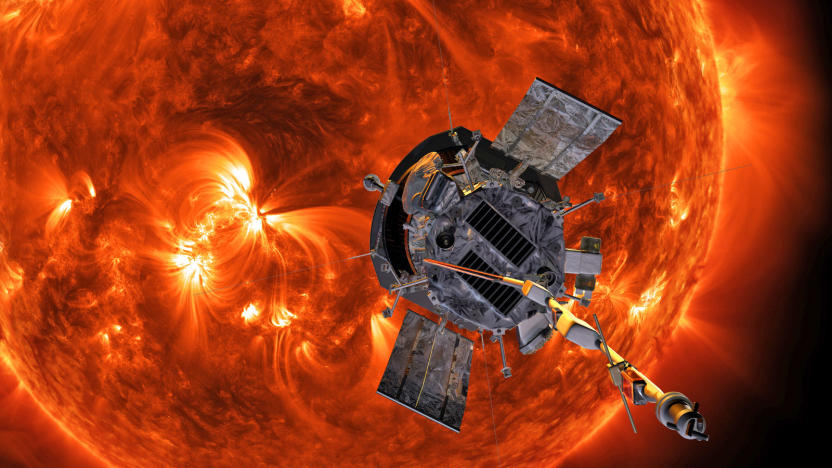solarwinds
Latest

Microsoft confirms it found compromised SolarWinds code in its systems
Various organizations are grappling with the impact of a massive hacking campaign that compromised networks using SolarWinds’ Orion network management tools, and now Microsoft says it found “malicious binaries” on its systems. As Reuters reports, the NSA sent out a cybersecurity advisory on Thursday that specifically referenced Microsoft products like Azure and Active Directory as tools the attackers targeted to gain access to other resources. In a statement, Microsoft confirmed it had found “malicious binaries” on its systems from the attacks, but found no access that anyone had accessed production services or customer data.

State-sponsored hackers have breached the US' nuclear weapons agency
Foreign hackers have breached the networks of the US Department of Energy and National Nuclear Security Administration.

Foreign state hackers reportedly breached the US Treasury (updated)
Hackers backed by a foreign government reportedly breached the US Treasury Department and NTIA, stealing info in the process.

The fastest human-made object launches for the Sun this Saturday
If the weather remains favorable and everything goes according to plan on August 11th, NASA is sending a spacecraft to the sun. The Parker Solar Probe will go closer to the massive ball of gas and plasma keeping our solar system together than any other spacecraft has gone before. It will brave extreme temperatures reaching up to 2,500 degrees Fahrenheit to collect data and images of the sun's atmosphere called "corona." The spacecraft will also reach speeds up to 430,000 mph, making it the fastest-ever human-made object. That's nowhere near fast enough to reach Alpha Centauri within our lifetime -- it has to travel around 7,000 years to reach the star closest to our sun -- but fast enough to get from Philadelphia to DC in a second.

NASA's closer to knowing why Mars' surface is cold and dead
It looks like NASA's figured out one of the reasons why Mars isn't fit for human -- or any other kind -- of life. The space agency held another press conference to discuss why Mars has turned from what was thought to be a wet, lush planet (that might have contained surface life) into a cold, desolate place. The likely culprit? Solar winds. With a little help from the MAVEN probe (Mars Atmosphere and Volatile Evolution), researchers were able to figure out how much of the planet's atmosphere is being stripped away by solar winds -- around 1/4 pound of gas every second. Bruce Jakosky, MAVEN's principal investigator at the University of Colorado, likened the atmospheric loss to taking a small amount of coins out of a cash register every day -- at first it's insignificant, but over time can have a big impact.

US budget has NASA planning to capture an asteroid, USAF reviving DSCOVR (video)
Many have lamented the seeming decline of the US space program. While we're not expecting an immediate return to the halcyon days, the President's proposed federal budget for fiscal 2014 could see some renewed ambition. NASA's slice of the pie includes a plan that would improve detection of near-Earth asteroids, send a solar-powered robot ship (like the NASA concept above) to capture one of the space rocks and tow it back to a stable orbit near Earth, where researchers could study it up close. The agency would have humans setting foot on the asteroid by 2025, or even as soon as 2021. It's a grand goal to say the least, but we'd potentially learn more about solar propulsion and defenses against asteroid collisions. If NASA's plans mostly involve the future, the US Air Force budget is looking into the past. It's setting aside $35 million for a long-discussed resurrection of the Deep Space Climate Observatory satellite, also known as DSCOVR -- a vehicle that was scuppered in 2001 due to cost overruns, among other factors. Run by NOAA once aloft, the modernized satellite would focus on warning the Earth about incoming solar winds. That's just one of the satellite's original missions, but the November 2014 launch target is relatively realistic -- and we'll need it when the satellite currently fulfilling the role is overdue for a replacement.

WebHelpDesk acquired, Mac and Linux versions disappear [Updated]
Web Help Desk is software that runs on Mac OS Server, among other platforms -- it's an enterprise "help tracking" package that allows small and large companies to track IT and help support across large teams and customer bases. Users access the ticketing system via their web browsers, or via their iPhones with the Web Help Desk iOS app. The company that makes this software just got acquired by another IT software company called Solarwinds, but apparently Solarwinds is planning to do things over there a little differently: the Mac and Linux version download links have been removed from the website. A salesperson at the company emailed TUAW reader Neil, and says that "moving forward [Web Help Desk] is strictly Windows-based." That's a strange decision -- according to the company's page, even Apple makes use of the Web Help Desk software, so there's definitely a call for the Mac version. On the company forums, another representative says the issue isn't quite over yet: Web Help Desk will continue to support previous Mac customers, and hasn't yet decided what the future holds. In the meantime, there are plenty of alternatives for issue-tracking systems like this, many of which will work fine on Mac OS (and quite a few that are open source as well). Our own Brett Terpstra recommends the hosted Tender web app as a support solution, so that's worth checking out as well. Still, migrating from one of these systems to another is likely a huge pain, so hopefully Web Help Desk and Solarwinds will find the resources necessary to keep its Mac version up and running. Update: Solarwinds has contacted TUAW to say that the Mac and Linux versions are still available from the company, and still supported. Anyone who wants to use or try out the software on Mac or Linux need only ask, and the software will be provided to them. So why were the links removed? Denny LeCompte, the VP of Products at Solarwinds, had this to say in our comments: "Since we acquired Web Help Desk on July 25 and started selling it the very next day, we handed a brand new product to our sales team with very little time to train them. For the short term, we chose to reduce the variety of OS's we support for the 30-day free evaluation period. We did that to make it easier for the sales engineers to support the new product and provide a great experience for customers. We chose Windows to start with because it was the most popular evaluation download for Web Help Desk. We expect that we'll add back OS's to the evaluation as the internal team comes up to speed on the new product. And as a couple of the commenters point out, the UI is completely web-based, so we're really only talking about which server OS it runs on. The founder of Web Help Desk was and is a big Apple fan, and the product is built on an Apple coding platform, and the UI has a very Mac OS feel to it. It's one of the reasons so many Mac folks have gravitated to the this product, and one of the main reasons we chose to acquire it." You can read more of his statement below. Thanks, Neil!

Inhabitat's Week in Green: robot cars, solar winds and the DeLorean EV
Each week our friends at Inhabitat recap the week's most interesting green developments and clean tech news for us -- it's the Week in Green. In case you missed it yesterday, the big green tech news of the week rolled in last night with the announcement of Google's top-secret robot car project, which has been deploying and testing self-driving robot cars on the streets of California over the past several months! (Engadget covered it here). It's also been a big week in general for green transportation announcements, as several supercharged electric vehicles hit the streets last week: the Delorean EV took us back to the future and SiGNa Chemistry unveiled an electric bike that runs on water. Finally, from the realm of tomorrow we brought you the future of moving house: strapping your home to an enormous balloon and lifting off for the skies. This week solar power also lit up the newswires as President Obama announced plans to deck out the White House with photovoltaics this coming spring and scientists proclaimed that interstellar solar winds could provide 100 billion times the Earth's energy needs. We were also wowed by a dog park powered by poo in Cambridge, and we can't wait to get our hands on this new copper-covered Nokia phone that recharges its battery using body heat. Speaking of eco gadgetry, we also showcased a set of gorgeous wooden wristwatches, and the world's first iPhone 4 cover made of plants. Green lighting was also a hot topic this week as scientists created a new type of glowing nano LED and we spotted an array of luminous lamps made from salt at the London Design Festival. We also learned how a wireless router scored a date for one lucky Inhabitat writer, and how Inhabitat editor Jill's solar-powered backpack has been a real conversation starter. See, green gadgets can help you make friends and influence people!




